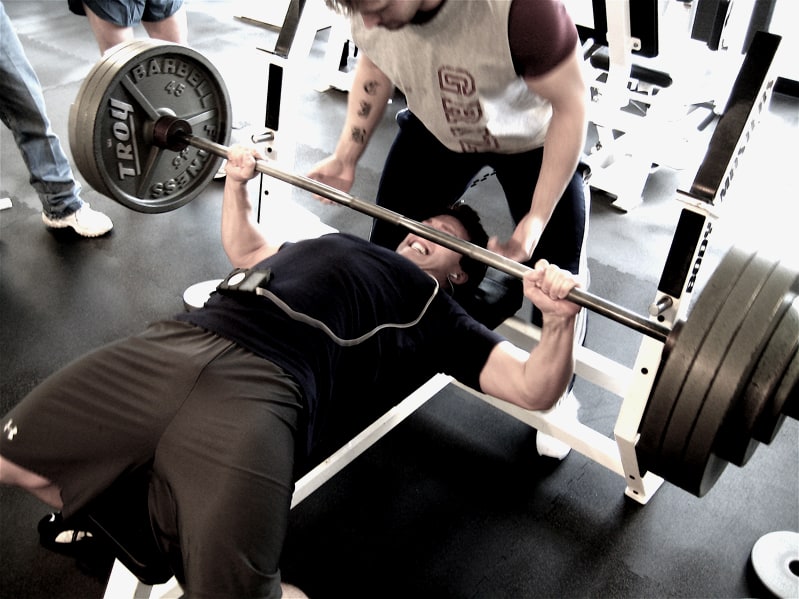Bench presses are an excellent way to build your chest and increase overall strength. So it comes as no surprise that if you want to increase your weights on this exercise. However, it is important that you increase your weight the right way in order to avoid any potential injury. Here’s a look at the optimal time to step up the weights on your bench presses.
What are the Advantages of Increasing Weights to Your Bench Presses?
First, let’s take a look at the reasons why you will want to consider increasing the weights on your bench press. As you will see, increasing weights will be able to help you out in a number of ways.
1). Builds a bigger upper body
If you are looking to get that big, broad chest, then bench presses are going to be one of the most efficient exercises that you will integrate into your workout. Bench presses help build up the pecs and the triceps along with other areas of your body like your delts (shoulders), forearms, and core.
2). Increases overall strength
The first and perhaps biggest benefit of increasing the weights on your bench press is that you will be able to build up your overall strength. This will come in handy when it comes to other exercises as well.
3). Helps build endurance
When it comes to working out, you want to make sure that you can build up your overall endurance. When you start to increase your weight, your muscle will begin to get better engaged and your breathing will become more efficient. This will allow you to become better during your weight as well as cardio workouts.
Use the “2 for 2” Rule
Perhaps one of the best ways to know when to increase your bench presses is to use what is known as the “2 for 2” rule. With this rule, you will increase your bench press weights when you are able to do 2 extra rep for 2 consecutive workouts.
Example of the “2 for 2” Rule
You are able to bench press 185 pounds clean for eight reps. On the next workout, you are able to bench press 185 pounds for ten clean reps The workout after that one, you are again able to bench press 185 pounds for ten clean reps. At this point, you should be able to increase your bench press weight up to 205 pounds for eight reps.
How Much Should I Increase My Weights?
When you are increasing weights, you want to make sure that you don’t overdo it. That’s why you should play it safe and only increase the weight by 20 pounds. You want to make sure that you can complete at least eight clean reps at the higher weight. If you are unable to complete eight higher reps, then you should go back to the previous weight.
How to Increase Your Weights
Now that you know when to increase your weights during bench presses, you may want to know how to get your body in a position to increase your weights. Be sure to follow these tips that can help you progress on your bench presses:
1). Be Sure to Warm Up Before Your Work Out
You want to make sure that your muscles are loose and you have your body flowing properly before you begin to lift. Here are some warm-up exercises that can put you in the proper physical shape to lift:
- Jog forward and backward 20 yards at 3 reps each
- Shuffle 20 yards for 3 reps
- Skip forward and backward for 20 yards for 3 reps
- Stright-arm band pulls for 15 reps
- Push-up position hold for 20 reps
2). Practice Proper Positioning and Form
It is important that you have the proper form when you are bench pressing. Here are some tips to help make sure you are in the proper position to leverage your strength properly on the bench:
- Lay on the bench with your eyes directly under the bar
- Feet are planted firmly on the ground
- Have four points of contact: feet on the ground, butt on the bench, shoulder blades on the bench, and head on the bench.
- Place your hands shoulder-width apart on the bar
- Have your spotter ready behind the bar
- Hold your breath while lowering the bar
- Stop the bar one inch from your chest
- Exhale and raise the bar until your arms are straight
3). Have a Spotter
It is always critical to have a spotter with you when you are increasing weights The spotter will be there to help you with the bar if you are having trouble getting the bar back onto the rack. Also, a good spotter will encourage you to execute a clean rep.
4). Engage the Right Muscles
Make sure that you are engaging the right muscles when you are executing a bench press. The muscles that you will be engaging will include your pectoral majors (Chest), anterior deltoid, and triceps. Also, remember that you will need to engage your stabilizing muscles to ensure proper positioning. These muscles include the rotator cuff, anterior deltoids, biceps, and triceps.
5). Use Your Legs and Lower Body
Some people forget to engage their legs during a bench press. As one of the most powerful parts of your body, your legs can give you the stability and power to get progressively better results on your bench presses. Additionally, engaging your glutes and your hips will give you the stability to better follow through on your reps.
Making Progress on Your Bench Presses
Bench presses can be one of the most rewarding exercises for your body as well as your mind. Therefore, make sure you know when you are ready to increase your weights on the bar. With the proper warm-up, positioning and determination, you will be able to successfully increase your bench presses and see some real results on your workouts.

